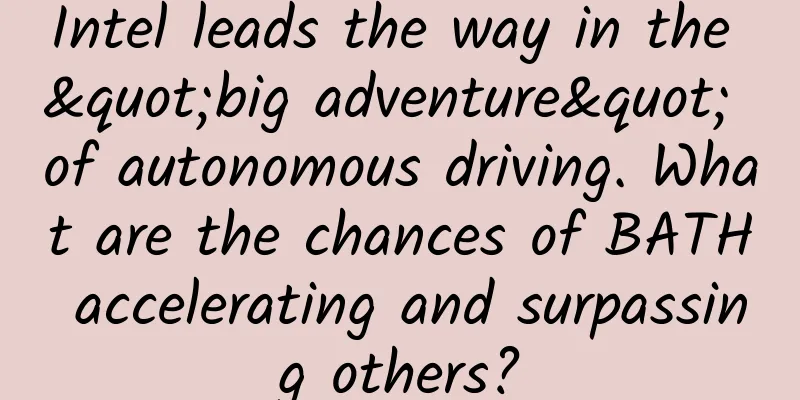Intel leads the way in the "big adventure" of autonomous driving. What are the chances of BATH accelerating and surpassing others?

|
Intel, which has pulled the fuse, is igniting a battle for the future of autonomous driving. In this spring of Gengzi when the mist is still lingering, the wealthy Intel has started its "buy, buy, buy" rhythm again, this time in the field of autonomous driving. Recently, Intel officially announced that it would acquire Israeli transportation solution provider Moovit for $1 billion. So, what exactly is Intel planning to do by spending a huge amount of money to acquire "Israel Didi"? In fact, this is the third time Intel has invested heavily in the field of autonomous driving. In 2017, Intel spent $15.3 billion to acquire Israeli computer vision company Mobileye, and in December last year, Intel acquired Israeli AI company Habana Labs for $2 billion. Intel's ambition to invest heavily in autonomous driving is undoubted. Indeed, the "ambitious" Intel does not want to be limited to being a chip supplier. Directly entering the middle and lower reaches of the industry is related to its future, and autonomous driving is a big cake in their eyes. Whether it is passenger cars or related travel services, autonomous driving holds great business opportunities. According to a McKinsey report, by 2030, the number of autonomous passenger cars will reach about 8 million, and autonomous driving will account for about 13% of total passenger mileage (PKMT); by 2040, the number of autonomous passenger cars will reach about 13.5 million, and PKMT will reach about 66%. The total sales generated by this will reach about US$230 billion in 2030 and about US$360 billion in 2040. By 2030, the amount of orders for travel services based on autonomous driving will reach about US$260 billion, and by 2040, it will reach about US$940 billion. Data is boring, but reality is gratifying. At present, autonomous driving has brought huge wealth appreciation to Intel. According to the financial report, autonomous driving chips became Intel's largest growing business segment in 2019, achieving nearly $1 billion in revenue, a year-on-year increase of 26%. At the same time, Intel also took 70% of the global assisted driving (ADAS) market share. Intel's Big Bet on the Future How could Intel, which had missed the smartphone boom for more than a decade, let go of this chance to turn things around? So Intel started this big gamble on its own future. From technology to data to talent, Intel doesn’t want to let go of any of them. After all, for Intel, which lacks core autonomous driving technology, markets, and even channels, the best shortcut to quickly break the ice or even seize the frontier is mergers and acquisitions. In April 2016, Intel acquired Yogitech, which develops chips for robots, driverless cars and other automated equipment. The following month, Intel acquired Itseez, a Russian company that focuses on computer vision technology development. Later, Arynga, an online upgrade service provider for automotive systems, also became Intel's possession. This was not enough. In early 2017, Intel also acquired about 15% of the shares of HERE, a map provider. Data has always been the core of Intel's battle to break through in autonomous driving. This means that if Intel wants to eclipse strong competitors such as Nvidia and Qualcomm, simple technological innovation and general data are no longer in its sights. As a result, Intel also has to target companies that can provide it with rich data. In 2017, an Israeli computer vision company called Mobileye came into Intel's sight. At that time, Mobileye had already provided autonomous driving technology to most mainstream automakers and was an industry leader in areas such as digital mapping and sensors. Intel began to "gamble big" and eventually acquired Mobileye for US$15.3 billion. However, Mobileye's total revenue for the whole year of 2016 was only US$358.2 million, which means that the acquisition premium was nearly 40 times. Obviously, Intel is more interested in the prospects of Mobileye's autonomous driving and wants to rely on this acquisition to reshape the industry landscape. In 2020, even though Intel encountered an epic "black swan" epidemic, it never concealed its ambitions in the field of autonomous driving. Great adventure during the epidemic Although $1 billion is far less than the acquisition of Mobileye, it is also a rare huge investment during the epidemic. After all, the global pandemic of COVID-19 has hit the entire transportation industry hard, and companies like Moovit will inevitably be affected. It has to be said that Intel chose to trade at the highest risk. Of course, it can also be understood the other way around. Now may be the cheapest time for Moovit. From a business perspective, visual recognition (chip + algorithm) is Mobileye's main technology. Not only that, it also has abundant manufacturer resources and relatively mature products. It can be seen that Intel can quickly establish its own complete automotive business department based on Mobileye. So why did it bother to choose to acquire a startup company Moovit during this special period? In fact, Moovit has a long history with Intel and Mobileye, and the acquisition was just a natural thing. In the second year after acquiring Mobileye, Intel led the D round of financing for Moovit. It is worth noting that this $50 million investment allows Intel, as a shareholder, to enjoy the benefits of Moovit and to a certain extent share the cost of future acquisitions. This shows that Intel has long been "in love" with Moovit. At this time, Moovit also started to have close ties with Mobileye. After receiving the investment, Moovit co-founder and CEO Nir Erez pointed out that he would work with Mobileye to create future travel. At the same time, Mobileye founder and CEO Amnon Shashu joined Moovit's board of directors as an observer. Intel's optimism about the autonomous driving travel service market is the main reason for this deal. Intel predicts that by 2030, the market size of robot taxi services will reach 160 billion US dollars. Although not as optimistic as the McKinsey report, it is still a huge piece of cake. How can Intel fall behind? Therefore, "obtaining and running reliable real-time traffic data and intelligent driving paths" as soon as possible has become Intel's top priority. Moovit's greatest value is data, which is also a resource that Intel is eager to obtain. In Intel's own words, Moovit can fill the data gap of Mobileye in global travel, help it become a "complete travel solution provider", and eventually land commercial autonomous driving taxi service. Specifically, Moovit, one of the main competitors of Google Maps, claims to be the world's largest public transportation data and analysis company. Its data comes from government departments, public transportation operators and users. The data sources are diverse and relatively reliable. The company provides two major businesses. On the one hand, it provides users with real-time public transportation data, the best travel routes and time information. On the other hand, Moovit also provides urban traffic statistics and analysis reports for the government to carry out traffic planning and improve urban traffic conditions. This is a great new attraction for Mobileye to build a powerful fleet of self-driving taxis. In addition to data and technology, the acquisition will also bring users from dozens of countries and regions around the world to Intel's self-driving taxi business. Moovit co-founder and CEO Niel Erez said: "Moovit expects the number of users to exceed 1 billion by 2021." Moovit said that by 2020, the number of users will exceed 800 million, across 3,100 cities in 102 countries and regions and 45 languages. In addition, the introduction of talent and its integration into Intel's macro-strategy is also a benefit of this deal. According to Israeli domestic media, employees will receive 10% of the final amount of the $1 billion acquisition fee as job retention money. With a lot of technology, data, and talent, this acquisition seems to be a great value for money, but whether Intel can achieve its goal depends on its actual performance. But what is certain is that by acquiring Moovit, Intel has a driverless taxi booking platform, which has established its position as a "big player" in autonomous driving. As giants compete for supremacy, is the East more exciting? With the same "buy, buy, buy" model and the same unwillingness to fall behind, traditional car companies with strong financial resources have joined the market. General Motors' autonomous driving companies Cruise Automation and Zoox, Ford's independent autonomous driving companies Argo and Waymo... all of them are from famous families in the field of autonomous driving. Traditional car companies not only have strong capital, but also have the ability to build cars, which is something that technology companies like Intel do not have. It can be seen that there is no shortage of "players" in autonomous driving. Compared with competition, cooperation has become the best route for technology giants like Intel. Mobileye, Moovit's senior brother, announced in November 2019 that it would cooperate with NIO to build L4 autonomous driving cars based on NIO's second-generation vehicle platform. At the same time, Mobileye will also purchase NIO ES8 special editions for smart travel services. In this cooperation, Mobileye provides chip technology, while NIO provides vehicle manufacturing, ultimately achieving integrated production and sales, and feeding back to Mobileye's future travel service business. It is not difficult to see that even Intel cannot ignore the role of the Chinese market. In fact, the Chinese market has long become the hottest region in the global autonomous driving industry: From 2016 to 2017, the autonomous driving industry became extremely popular and became an industry favored by capital. In 2018, Level 2 autonomous driving ushered in a wave of popularization, and BAT all confirmed their entry into the autonomous driving market. In 2019, the autonomous driving industry gradually returned to rationality and "alliances" were formed among companies. 2020 is the “first year of mass production” of L3 autonomous driving systems...... Unlike the development path of "self-driving" in the United States, China, where road conditions are more complicated, adopts "cooperative autonomous driving", that is, vehicle-road collaboration, replacing "active perception" with "communication" part. As a pioneer in the field of autonomous driving, Baidu has been engaged in research and development and layout for ten years. The Apollo autonomous driving platform has also entered its third year. At the end of April this year, Baidu Apollo Robotaxi landed in Changsha, and driverless taxis entered the large-scale operation stage. This is also the first Robotaxi service in China open to the public through national-level applications. In addition to Baidu, e-commerce giant Alibaba is also the biggest supporter of vehicle-road collaboration. Since Alibaba has powerful cloud computing power, it has a natural advantage in the construction of smart cities and smart transportation. The introduction of dedicated roadside base stations will enable smart cars to make better driving decisions through V2X vehicle networking. However, Huawei also has the greatest potential in the field of autonomous driving. In Ren Zhengfei's words, "it designed its chips according to the L4 standard from the beginning." Huawei's perfect chip system is the strongest backing for its entry into autonomous driving. Chips have always been a shortcoming of China, and American companies such as Intel have always been "experts" in this field. The Ascend series AI chips developed under the new Da Vinci architecture focus on AI computing power requirements. Huawei's MDC intelligent driving computing platform is built based on this chip. In terms of computing power, the maximum power consumption of Ascend 310 is 8W, the computing power is 16 TOPS, and its energy efficiency is 2 TOPS/W. In contrast, Intel Mobileye's EyeQ4 has a power consumption of 3W, a computing power of 2.5 TOPS, and an energy efficiency of 0.83 TOPS/W. Obviously, Huawei's Ascend 310 is significantly better than the industry level. Huawei, which "does not make cars", is involved in all other automotive supply chains, except for not making cars themselves. Today, the three major platforms of smart driving, smart cockpit and smart electric have become the core business of Huawei's entry into the "car circle". In the future, Huawei will focus on the development of software + hardware such as chips, algorithms, cloud services, V2X, operating systems, etc. In other words, except for chassis, wheels, body and seats, Huawei can currently provide all car-making technologies. "We are different", both Xiaopeng and Weilai have said this to Tesla. Tesla, which is rooted in the US market, does not have local advantages. This also applies to the field of autonomous driving. Perhaps the breakthrough in China's travel still depends on local strength. As "Intel-branded" cars quietly enter the historical stage, the battle for global automotive chips has already begun. BATH (Baidu, Alibaba, Tencent, Huawei), which stands at the forefront of the new infrastructure, is accelerating its surpassing. As a winner of Toutiao's Qingyun Plan and Baijiahao's Bai+ Plan, the 2019 Baidu Digital Author of the Year, the Baijiahao's Most Popular Author in the Technology Field, the 2019 Sogou Technology and Culture Author, and the 2021 Baijiahao Quarterly Influential Creator, he has won many awards, including the 2013 Sohu Best Industry Media Person, the 2015 China New Media Entrepreneurship Competition Beijing Third Place, the 2015 Guangmang Experience Award, the 2015 China New Media Entrepreneurship Competition Finals Third Place, and the 2018 Baidu Dynamic Annual Powerful Celebrity. |
<<: From now on, the best Android phones come from Google
Recommend
Why do people laugh so hard that they can't close their mouths? The secret that makes people drop their jaws...
"Hahaha, I can't stop, I can't stop ...
What is a flying wing layout? Why does the sixth-generation aircraft use an "old" design from decades ago?
The flying wing layout, as the name implies, is a...
Font size is bigger and clearer! WeChat: Nearly 4.07 million users have activated caring mode
[[427576]] News on October 8, today, WeChat offic...
Cortana is good, but can it save Microsoft?
On July 30, Microsoft finally found a partner for ...
Damage to the liver, change genes? Do you still dare to "eat rainbow"?
Snacks are really a magical thing. From children ...
I may not want to live, but there must be no problems with my medical examination reports!
The annual physical examination season is here “W...
Is Tik Tok restricting influencers from promoting products?
In the past few months, Douyin has been imposing ...
App promotion and application insight report!
According to our data monitoring of the mobile ap...
Why is critical thinking important?
Every day, we are exposed to a lot of information...
CaoCao's "Private Domain Traffic Precision Transaction Technique" Learn to build your own private domain traffic
CaoCao Private Domain Traffic Precision Transacti...
The night of White Dew and Autumnal Equinox is colder every night! What should I do if my nose is suffering during the season change?
"On the nights of White Dew and Autumnal Equ...
What technology will Apple's 5G iPhone 12 use? There are still different opinions
There's still no definitive answer as to whic...
How much does it cost to rent a website server?
Any industry can develop its own website. Nowaday...
A magnetar was discovered in the Milky Way, producing strong radio bursts, only 30,000 light-years away from us
[Mobile software: Bo Ke Yuan] Using the Canadian ...









